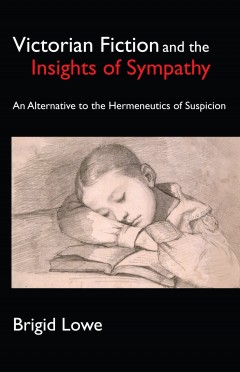Victorian Fiction and the Insights of Sympathy
An Alternative to the Hermeneutics of Suspicion
By Brigid Lowe
Other Formats Available:
- About This Book
- Reviews
- Author Information
- Series
- Table of Contents
- Links
- Podcasts
About This Book
This book explores the importance of sympathy as a central idea behind Victorian fiction, and an animating principle of novel reading generally. Sympathy, Brigid Lowe argues, deserves a much more important role as both a subject and a guiding principle for literary criticism.
Over the past thirty years, much literary theory has approached literature in general, and Victorian fiction in particular, in a spirit of suspicion. It has tried to purge criticism of the human subject, and of that distinctively human faculty, sympathy. Reading in a contrary, sympathetic mode, Lowe turns the tables on theoretical orthodoxy by submitting some of its central premises to the sympathetic suggestions of novels by Dickens, Gaskell, Eliot, Charlotte Bronte, Charlotte Yonge and Dinah Craik. Their explorations of such diverse issues as history, imagination, individual rights, family, and social responsibility, highlight sympathy as a cornerstone of human nature and humane conduct. Lowe argues that not only literary theory, but our culture more generally, would greatly profit by opening itself up to a sympathetic exchange of ideas with another age, and giving Victorian intimations of sympathy a sympathetic hearing.
Lowe’s exploration of sympathy as part of the dynamics of reading will be of interest to academics and students working on fiction in all periods, and especially to those concerned with aesthetic and critical theory. Her investigation of the role of sympathy in a range of nineteenth-century cultural debates, in particular in relation to gender and the family, should also interest cultural historians. The engaging argumentative momentum of ‘Victorian Fiction and the Insights of Sympathy’ will appeal to anyone interested in why we do, and should, go on reading Victorian fiction.
Reviews
'This book is a great and not-to-be missed treat for anyone with an interest in Victorian cultural history.' —‘The Dickensian’
'An ambitious, intelligent and courageous book... Lowe presents an unusually forceful answer to the question of what we might learn from reading Victorian fiction.' —Adrian Poole, Professor of English and Comparative Literature at the University of Cambridge
'This is a wonderfully - well - sympathetic reading of some classic Victorian fictions in their extended engagement with the large matter of human sympathy, a matter often touched on by literary historians but never with Brigid Lowe’s reach nor anything like her delicately probing touch.' —Valentine Cunningham, Professor of English Language and Literature at Oxford University
Author Information
Brigid Lowe is a Research Fellow at Trinity College, the University of Cambridge.
Series
Anthem Nineteenth-Century Series
Table of Contents
Acknowledgements; Introduction: Critical Missiles and Sympathetic Ink; Charles Dickens, Uncommercial Space-Time Traveller: Dombey and Son and the Ethics of History; Other People’s Shoes: Realism, Imagination and Sympathy; The Personal, the Political and the Human, Part I: Sympathy – a Family Affair?; The Personal, the Political and the Human, Part II: Which Family Values?; The Personal, the Political and the Human, Part III: ‘The Torn Nest is Pierced by the Thorns’ – Sympathy after the Family; Envoi: Symathetic Magic; Bibliography; Index
Links
Stay Updated
Information
Latest Tweets



